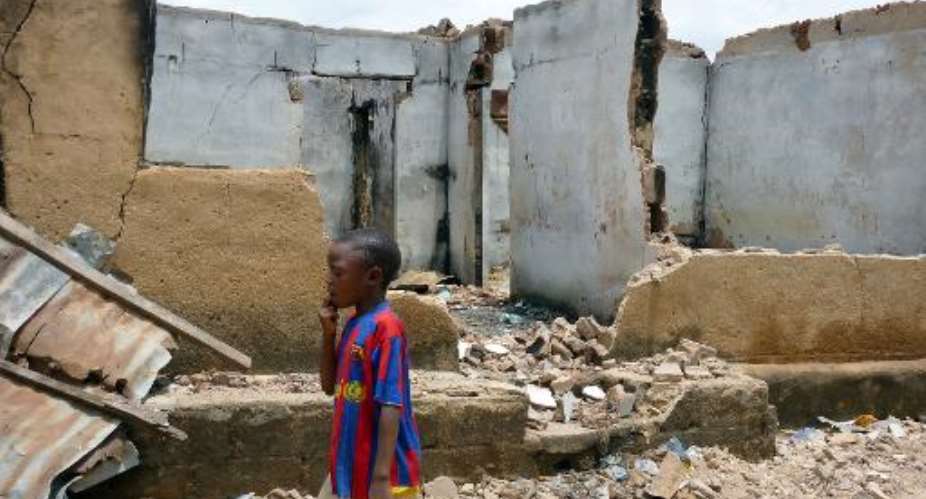Madakiya (Nigeria) (AFP) - All that's left of the Muslim neighbourhood in Madakiya, in Nigeria's northwestern Kaduna state, are decomposing bricks and graffiti-covered walls standing in fields of charred grass.
Muslims and Christians once lived together in the village but Madakiya's entire Muslim population fled to a nearby town in rioting after the 2011 presidential election.
With Nigerians set to vote again next month, people in the religiously mixed state are wary of a repeat after houses were looted, markets burned, and people killed in the streets.
"I don't think something of that nature will happen but you cannot trust the politicians," said Luka Awage, a representative of the district head in Madakiya, which lies in the southeast of the state.
"What happened in 2011 was very, very unfortunate. And we don't pray for that."
This year's election on February 14 is on paper a rematch between President Goodluck Jonathan and Muhammadu Buhari, Nigeria's former military ruler.
But this year, Buhari is running under the banner of the All Progressives Congress (APC) coalition, which is believed to pose the biggest challenge to Jonathan's Peoples Democratic Party (PDP) in years.
The PDP has won every election in Nigeria since the country returned to democracy in 1999.
Political clout in Nigeria often breaks down along religious or ethnic lines.
Jonathan is expected to do well in the mainly Christian south while Buhari is likely to win most of the states in the Muslim-majority north and the commercial capital Lagos, an opposition stronghold.
- A 'misunderstanding'? -
The southern half of Kaduna State is dominated by churches and the north with mosques, with the religious mix a potential powder keg for violence.
In 2011, it exploded. Claims of rigging sparked rioting across the north, leaving some 800 people dead, according to Human Rights Watch.
In the state capital Kaduna city, mobs bludgeoned to death Muslims and Christians found on the wrong side of the tracks; mosques and churches were torched; motorists were dragged out of cars and killed.
In Zonkwa, a town near Madakiya, HRW reported that 311 Muslims were buried in a mass grave.
Fighting in Kafanchan, across a bridge from Madakiya, erupted shortly after Jonathan's win was announced. People from both communities lay dead and the main market was razed.
Christians who still live in Madakiya and Muslims from the village who now live in Kafanchan dispute the events of 2011.
Isa Musa still carries a bullet in his chest from the night he was forced to flee to Kafanchan. Before the attack, Muslims and Christians lived peacefully, he said.
Philip Jagaba, a Christian whose house abuts the ruined Muslim quarter, said people started attacking Muslim homes at night after Jonathan was declared the winner.
But he said the violence started in Kafanchan.
The fighting only stopped the following morning when the military arrived, he said.
Ayuba Bartholomew, from Madakiya, described the dispute as "a misunderstanding with our neighbours".
"They interfered by trying to take the revenge on us. So we just decide to send them packing without touching any of their properties," he said.
Awage said the murder of a traditional leader started the fighting, and was exacerbated by reports of churches being burned.
"They were not forced to leave, they fled by themselves. And up till now, we still want them to come back," he added.
- Rumours, tensions -
James Wuye, a pastor with the Interfaith Mediation Centre based in Kaduna city, said the 2011 violence was caused by rumours, political incitement and a build-up of long-held tensions between different religions and ethnic groups in the state.
The centre has been working since then to put mechanisms in place to monitor hotspots like the state's southeast for threats of violence to allow government and community leaders to prevent fighting.
One side effect of the Muslim flight from Madakiya, Wuye said, is that the village is likely to remain calm in the coming weeks.
"Most of the non-Christians that are there have moved to other places, they have relocated. So, who are you going to fight with?" he asked.
The Muslim homes and mosques in Madakiya, left intact after the rioting, have slowly deteriorated over time, leaving nothing but foundations.
Jagaba burns the grass that has grown up around the ruins to prevent marauding herdsmen from attacking his home.
He doesn't expect the Muslims to come back. "People are still with tension in their minds," he said.
"When these things happen that involves lives, it take long time before agreement comes in between, so that they are fearing us (and) we are fearing them."





 We’ll no longer tolerate your empty, unwarranted attacks – TUC blasts Prof Adei
We’ll no longer tolerate your empty, unwarranted attacks – TUC blasts Prof Adei
 Bawumia donates GHc200,000 to support Madina fire victims
Bawumia donates GHc200,000 to support Madina fire victims
 IMF to disburse US$360million third tranche to Ghana without creditors MoU
IMF to disburse US$360million third tranche to Ghana without creditors MoU
 Truck owner share insights into train collision incident
Truck owner share insights into train collision incident
 Paramount chief of Bassare Traditional Area passes on
Paramount chief of Bassare Traditional Area passes on
 Two teachers in court over alleged illegal possession of BECE papers
Two teachers in court over alleged illegal possession of BECE papers
 Sunyani: Victim allegedly shot by traditional warriors appeals for justice
Sunyani: Victim allegedly shot by traditional warriors appeals for justice
 Mahama vows to scrap teacher licensure exams, review Free SHS policy
Mahama vows to scrap teacher licensure exams, review Free SHS policy
 Government will replace burnt Madina shops with a new three-story, 120-store fac...
Government will replace burnt Madina shops with a new three-story, 120-store fac...
